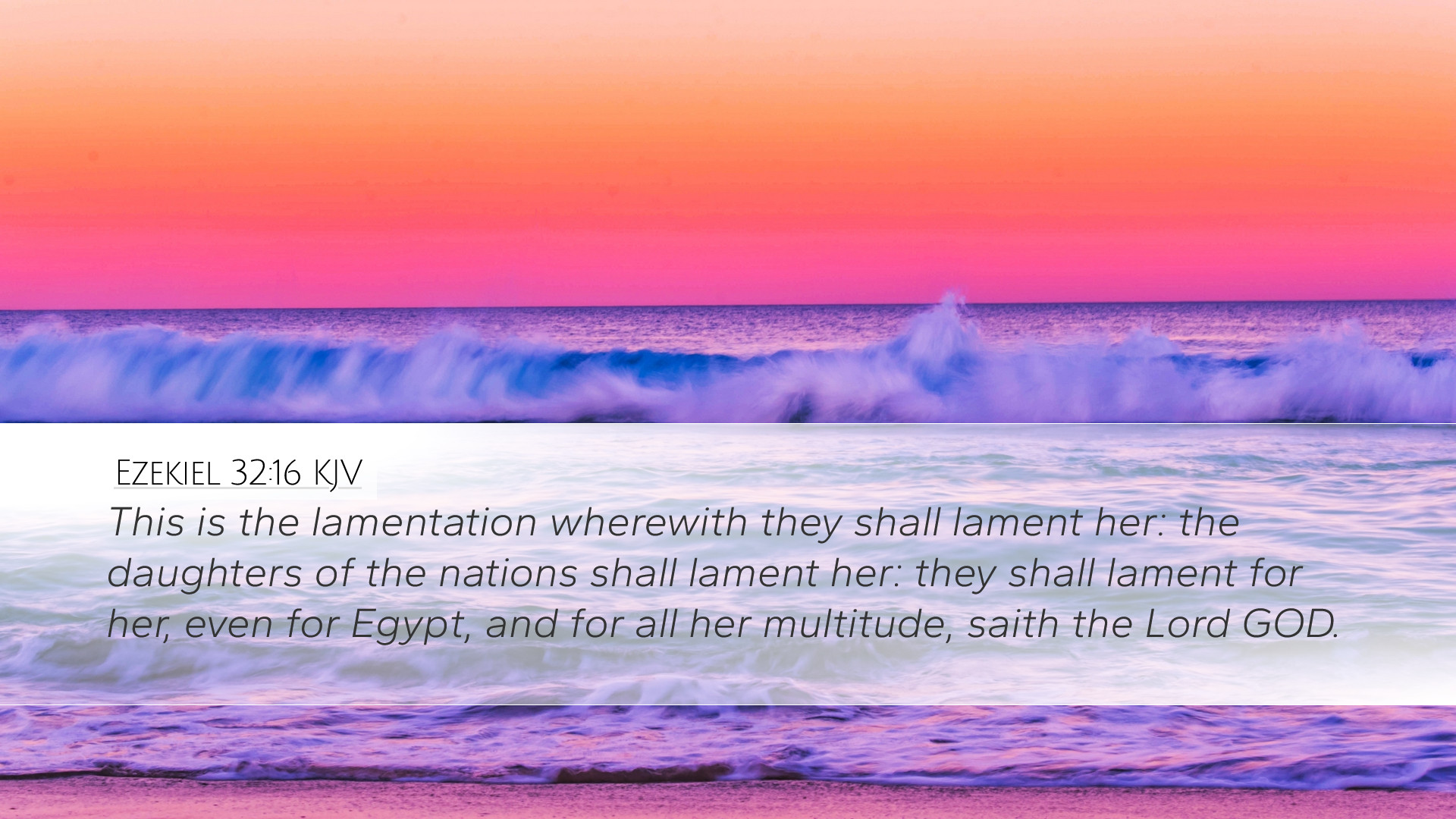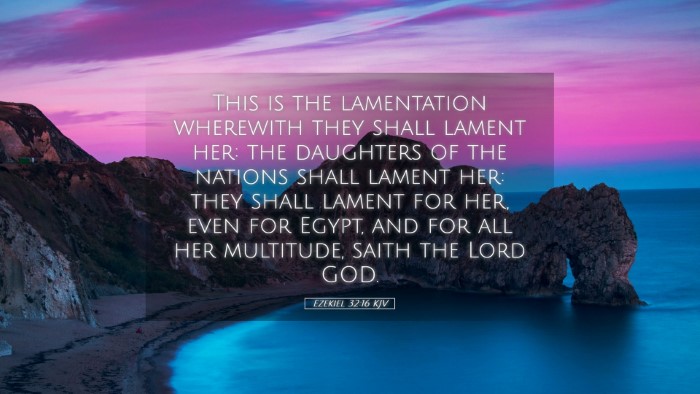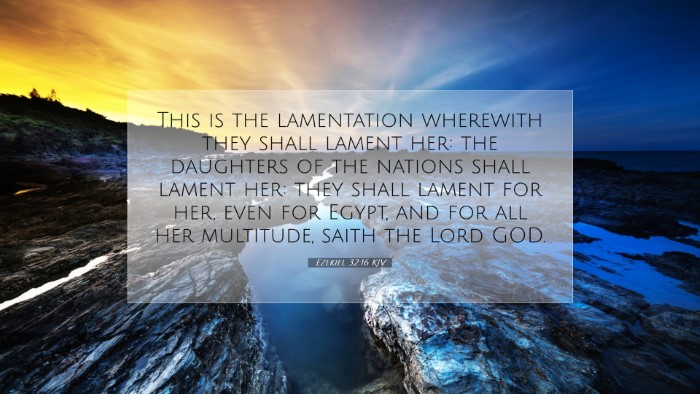Bible Commentary on Ezekiel 32:16
Ezekiel 32:16 (ESV): "This is a lamentation that shall be chanted; the daughters of the nations shall chant it; over Egypt and all her multitude shall they chant it, says the Lord God."
Introduction
The verse under consideration, Ezekiel 32:16, forms part of a larger prophecy regarding the judgment of Egypt and serves as a poignant reflection on the consequences of rebellion against God. It is set amidst a series of oracles highlighting God’s sovereignty over the nations and His just judgments. The lamentation described here evokes themes of sorrow, defeat, and the ultimate downfall that accompanies narcissism and pride.
Contextual Analysis
This verse is situated within a chapter where God proclaims His impending judgment on Pharaoh and Egypt. Ezekiel, acting as a mouthpiece for God, delivers a vivid prophecy illustrating the fate awaiting Egypt, reducing it to a desolate state. Public domain commentators such as Matthew Henry, Adam Clarke, and Albert Barnes offer invaluable insights into the significance and implications of this lamentation.
Matthew Henry's Commentary
Henry stresses the serious nature of this lamentation, noting that it is not merely a song of mourning but an oracle of judgment from God. He points out that the "daughters of the nations" signifies the collective response of surrounding nations, witnesses to Egypt's downfall. They are called to partake in this lamentation, highlighting the universal impact of Egypt’s fate.
- Universality of Grief: Henry notes that this lamentation signifies the far-reaching repercussions of Egypt's sin, affecting not only the Egyptians but their allies and neighbors, underlining the interconnectedness of nations in divine judgment.
- Symbol of Divine Justice: The act of lamenting serves as a reminder of the justice of God. Henry indicates that while the Egyptians were proud, they were ultimately brought low, demonstrating the moral order maintained by God.
Albert Barnes' Commentary
Barnes offers a nuanced understanding of the metaphorical language in this verse. He explains that the "lamentation" signifies a formal and structured expression of grief that will be echoed by the nations over Egypt's loss. This formality contrasts with spontaneous expressions of sorrow, indicating the profound impact of Egypt's demise on the geopolitical landscape.
- Chant of Nations: Barnes elucidates that "the daughters of the nations" can be interpreted as the cities or provinces that looked upon Egypt with admiration or envy, who now find themselves lamenting its downfall, representing an unexpected turn of events.
- Implication of Identity: The passage suggests that even Egypt’s identity as a thriving nation will be stripped away. Barnes emphasizes that their multitude, once a source of pride, becomes a cause for mourning, reflecting the ultimate fragility of human accomplishment.
Adam Clarke's Commentary
Clarke provides a thorough exploration of the cultural and historical significance of lamentations in biblical literature. He comments on how laments often serve to articulate the grief of a community and reflect the theological themes at play. Clarke suggests that the language employed in this prophecy reveals both the terror of God’s wrath and the sorrow of alienated nations.
- Function of Lamentation: Clarke illustrates the purpose of lamentations in Scripture as a means for the community to come together in sorrow and recognition of their own failings in light of God’s judgment.
- God’s Sovereignty: Clarke concludes that the lamentation serves not only to highlight Egypt's fall but also to reinforce God’s authority over nations. This passage reminds the reader that although one may rise to power, God has the ultimate say in matters of fate and status.
Theological Insights
The lamentation over Egypt provides significant theological insights into God’s character and His dealings with nations. It reinforces the idea that God is intimately involved in the affairs of men and maintains a sovereign will that cannot be thwarted.
- God’s Justice: The lamentation encapsulates the broader biblical theme of divine justice. God's judgment is inevitable for those who oppose Him, and this foresight serves as a reminder to nations and individuals alike.
- The Call to Repentance: This passage functions as a call to repentance. History reveals that nations, like individuals, have a choice to humble themselves before God instead of being led to lamentation.
- Hope Amidst Judgment: It is crucial to understand that even in judgment there exists the hope of restoration for those who turn back to God. If Egypt had heeded this warning, there might have been different outcomes.
Conclusion
In striping away Egypt's multitude and bringing forth a lamentation, Ezekiel 32:16 serves as a stark reminder of the consequences that await those who choose pride over humility. This vivid portrayal of grief reflects God’s righteous judgment and invites nations, including today’s society, to reflect on their spiritual standing. As pastors, students, theologians, and scholars ponder this verse, it is an invitation to remember that while lamentation can signify an end, it also holds within it the seeds of reflection, repentance, and the hope for renewal and restoration.


